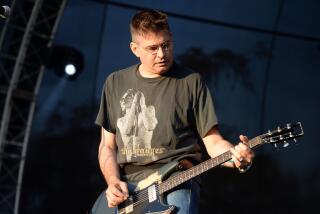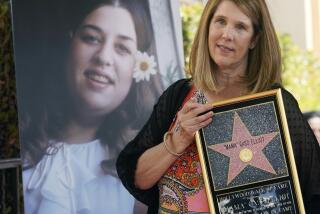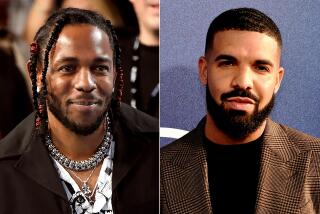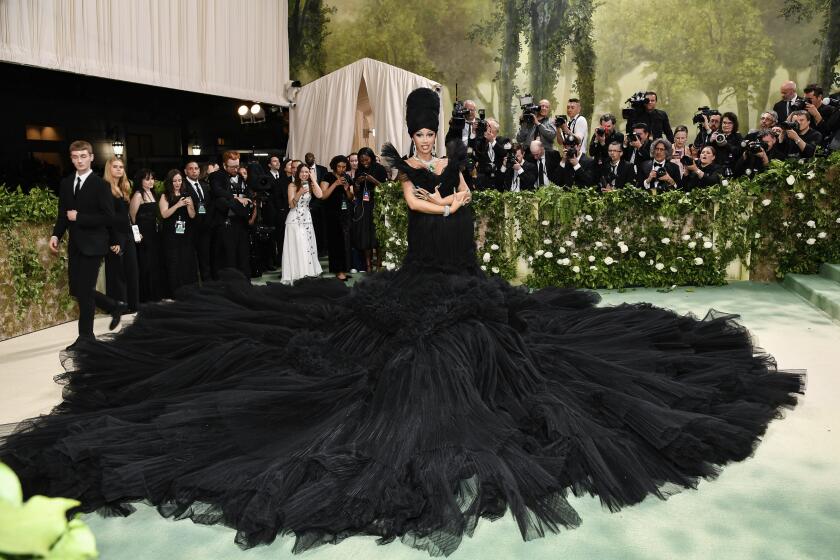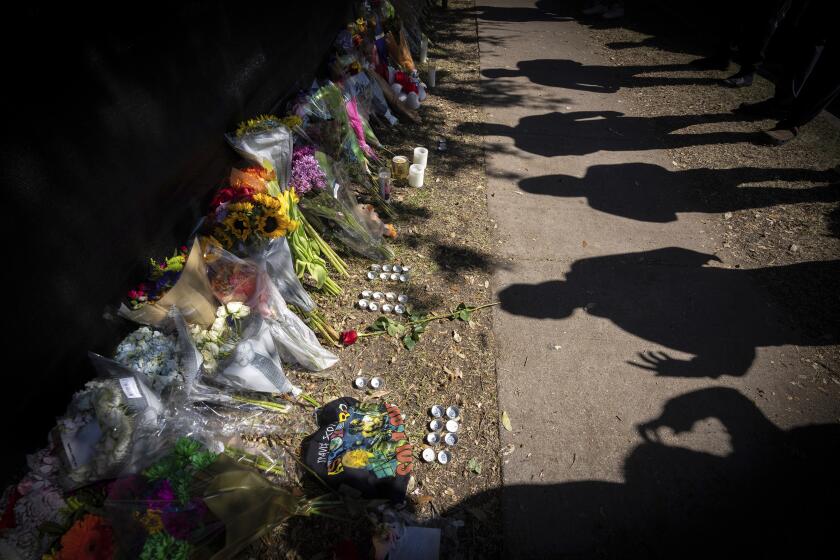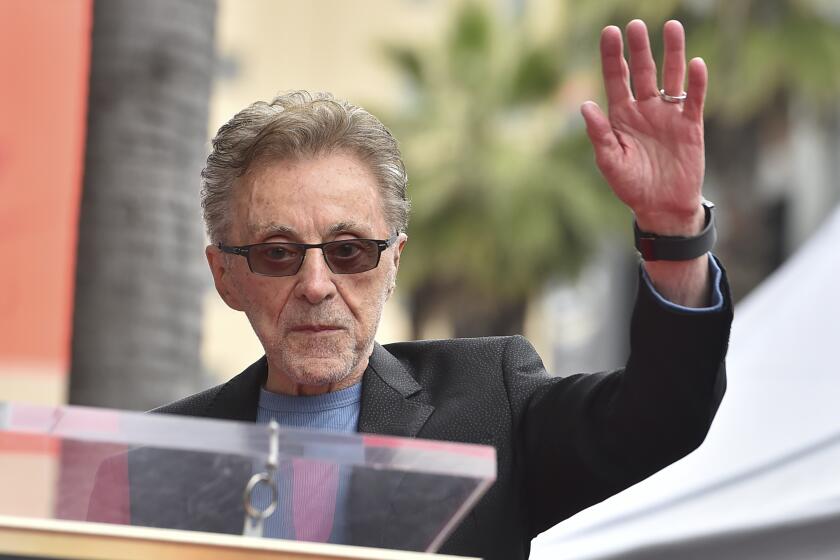Media Shy, Music Savvy : R. Kelly--a writer, producer and singer with the Midas touch--is a dominant force in R&B.; So what’s a little, um, intense scrutiny among friends? ‘You don’t know how I am in real life.’
Robert Kelly is a young man who likes to win--and keep his distance.
Whether you’re talking about the recording studio, where he has written or produced some of the biggest R&B; hits of recent years, or, in this case, his daily basketball game with a few members of his inner circle, it all comes down to victory.
Kelly’s sweat-soaked bald head glistens in the light of a street lamp as he looks past the opposing players toward the hoop, which has been set up near Kelly’s tour bus in a downtown Los Angeles parking lot. He’s in the area to film a video for his new single, “You Remind Me of Something.”
Kelly’s lanky but chiseled frame is clad entirely in white, giving him an almost angelic glow in the dwindling daylight. Even if he weren’t an R&B; superstar, it would still be difficult to keep your eyes off him.
Spinning through the defenders’ hacking arms, Kelly fakes to his left and goes up for an off-balance, right-handed layup, falling to the ground as the ball hits the backboard and banks into the basket.
Game--and fun time--are over.
Besides the video, Kelly has also agreed to do a rare interview. After delaying it for five hours while he plays basketball and works on the video, Kelly is ready. Sort of.
Picking himself up off the ground, he walks toward the sideline and into his bus.
“What’chu want to ask me about?” he asks with mild suspicion as he sits down, slightly winded from his workout. A thick drawl that doesn’t show up in his singing voice saturates his speech.
Kelly--who performs under the name R. Kelly--is a writer, producer and singer with the Midas touch. His production style, which is heavily rhythmic with a strong nod to hip-hop but elegant and smooth enough to merit comparison to the classic Isley Brothers ballads of the late ‘70s, is a dominant force in contemporary R&B.;
Turn on any urban radio station and seven of 10 songs will sound as if Kelly produced them. His first two albums, “Born Into the ‘90s” and “12-Play,” sold 1 million and 4 million copies, respectively, and his new collection, “R. Kelly,” is off to a fast start. It entered the pop charts at No. 1 last month and is expected to be a major seller through the holidays.
But he’s equally known in the industry for producing hits for other artists, notably Michael Jackson’s recent chart-topping single “You Are Not Alone.” Kelly has also produced million-selling singles for Changing Faces and teenage sensation Aaliyah.
So why does he tend to shy away from the media?
Kelly is sick of all the scrutiny that has accompanied his success, especially the avalanche of publicity involving his relationship with Aaliyah.
Although Kelly, through management statements, has repeatedly denied rumors that he married the singer, Vibe magazine last January reported finding an Illinois marriage license filed in September 1994 for Robert S. Kelly, 27, and Aaliyah D. Haughton, 18. (She would have been 15 at the time, based on the age she had given in earlier interviews.)
E ven close to a year later, with the two having split and Kelly having avoided interviews for many months, the subject is still sensitive. He declines during the interview to comment directly on her or the marriage speculation.
“To hell with music, singing and all this other [expletive], I’m a human being,” he says emphatically. “People need to get out of the kitchen and realize what’s going on here. There’s only one judge. And he ain’t even on the Earth. If you’re gonna be scared of someone, there’s only one person to be scared of, and that’s God. He’s the only one that can judge me. He who is without sin, cast the first stone. That’s what it all boils down to.”
Kelly suddenly looks drained, as if the weight of the world is on his shoulders.
“I’m not Robert anymore,” he says finally. “I love to be Robert, but everybody is trying to make me R. Kelly. When you become successful, you’re suddenly under the magnifying glass. If I’m on the court and I shoot a ball, it’s not like it used to be. I’m R. Kelly now, I can’t miss a single shot. If I do, people are like ‘Naw, he can’t play. He’s a buster. That brother better stay in the studio.’ With everything I do, I have to be on my Ps and Qs, but I don’t want to look at it that way.”
Being a superstar can be a tough job, even to someone as talented as Kelly.
It means being the man he portrays in his songs--the tireless Casanova with a sensitive warble in his throat and lust in his eyes. It means mixing, in his vocals and his delivery, the sinful and the sanctified--much as Ray Charles, Al Green and Marvin Gaye did before him.
It also means being the slow, deliberate Romeo in a song such as “It Seems Like You’re Ready” but being bold enough to tell a girl “I Like the Crotch in You”--because many of his female fans apparently appreciate the duality of his character.
Not that he’s without his critics, some of whom find his music sexist and overly erotic.
“People can watch Steven Seagal break arms for 45 minutes and not think he does that in real life, but when they listen to my music, they judge me,” Kelly says.
“I’m on TV too. It’s just that my movie only lasts an average of 4 minutes and 10 seconds. But you judge me. You say, ‘R. Kelly . . . he’s raunchy, he’s tripping.’ You don’t know how I am in real life.”
The lilting cadence of his voice almost makes it sound as if he’s giving a sermon.
“This is a musical thing, this is a show business thing,” Kelly says as he looks off into the corner at no one in particular. “Y’know?”
R obert S. Kelly was one of four children born to Joann Kelly, a single mother on Chicago’s South Side, an area as famous for its blues and gospel music as for its violent streets. When not on the courts, young Robert spent most of his time in the tiny choirs of storefront churches like the Holy Temple.
“We used to go to church even on Tuesdays and Wednesdays, sometimes,” he recalls, relaxing a bit as the interview proceeds to more comfortable territory. “I’d be in there hearing the Word and the music. People would throw their hands up and fall out in the aisles. I was always singing in the background, but I never had any solos.”
His mother’s strong hand kept him out of the streets and in school, avoiding the pitfalls of drugs and violence that consumed some of his homeboys. She couldn’t, however, change anybody else in the neighborhood. Shortly before he entered the Kenwood Academy, a prestigious public school in Chicago’s affluent Hyde Park section, Kelly was shot in the shoulder, where the slug remains lodged.
“I went through a lot of things I shouldn’t have experienced,” he says, “but it made me stronger at a young age.”
At Kenwood, under the guidance of music department head Lena McLin, a woman he sometimes calls his second mother, Kelly wowed a talent show audience with his rendition of Stevie Wonder’s “Ribbon in the Sky.”
“I was like, ‘Damn, so this is who I am,’ ” he says, as if he can still hear the applause. “That’s when I decided I wanted to take music all the way.”
Kelly took eagerly to piano and voice lessons and soon was composing his own songs. He bought a cheap keyboard and started playing publicly under the elevated trains and in front of restaurants, sometimes earning as much as $500 a sitting.
“Working on that dinky little Casio paid off,” he says, smiling at the way he made an instrument not designed for professional use work to his advantage. “That was my struggle, a part of my dream. It made me work harder--the Casio part of my life.”
One day Kelly went to audition for a gospel musical being staged by Barry Hankerson, Gladys Knight’s ex-husband and a veteran gospel theater producer. He was bowled over by Kelly’s voice and determination and became his manager in the late ‘80s.
Wayne Williams, a fellow Kenwood alumnus who had become a Chicago-based artists and repertoire representative for New York R&B; label Jive Records, signed Kelly to a deal in 1990, and the youngster was soon on his way.
C ertain of Kelly’s songs are derivative, a fact the composer doesn’t deny.
“Some people will hear the ‘Wooo!’ that I used from Total’s ‘Can’t You See’ in [the new album’s] ‘Hump Bounce,’ ” he says with a knowing smile later in the evening, riding in the back of a black stretch limousine to another shooting location.
“But Marvin Gaye used ‘Wooo!’ too. Never think you came up with something first. I can’t really say, ‘This is my sound,’ ‘cause I was inspired by Quincy Jones, Stevie Wonder and Teddy Riley. You should never be too proud to admit someone inspired you.”
God, not sex, is actually the driving force in Kelly’s life, to hear him tell it.
“You Are Not Alone”--the hit he wrote for Michael Jackson--is “a melody from heaven,” Kelly says with an almost stern expression on his face. “I call it a miracle because it touched so many people. It came out of my heart like no other song I’ve ever written--like a burst of life.
“If I leave what I’m doing, I’ll definitely go straight to gospel. I see myself as crossing a bridge. The other side is the light. I don’t know when I’m gonna get to the other side, but it’s there.
“I’m old enough to know right from wrong. Nobody can run Robert’s life, and I think that frustrates them. Nobody should care about my personal life--just my music.”
I t’s almost 9 p.m. as Kelly steps out of his limousine and surveys the video scene. Downtown skyscrapers loom overhead and a few helicopters buzz the area, picking up more footage.
Lyrics from the single float through the air, booming from various car sound systems:
You remind me of my Jeep ,
I wanna ride it .
Something like my sound ,
I wanna pump it .
Girl you look just like my car ,
I wanna wax it .
Something like my bank account ,
I wanna spend it, baby.
What about women who are sick of being seen in his songs as sex objects? Does he think they are going to like being compared to material items?
“People gave me all this hell just because I said, ‘I don’t see nothing wrong with a little bump and grind,’ ” he says, referring to the title of his 1994 hit single, “Bump and Grind.”
“I didn’t say anything that doesn’t happen everywhere in the world. You just have to face it. Everybody bumps and grinds once in a while.”
With that, an aide motions that it’s time for Kelly to assume his position in front of the camera. But first the normally reluctant star pauses for a final comment. There’s even a playful smile on his face.
“Don’t be mad at me about writing about making love, because that’s what I want to express,” he says. “How did you get here in the first place to interview me? Your mama [did the] bump and grind with somebody. Whether it was her husband or somebody she just met--just be glad to be here.”
As if on cue, a shapely model nearby waves at Kelly, who responds with the coolest of nods. Then, he’s gone. The cameras turn.*
More to Read
The biggest entertainment stories
Get our big stories about Hollywood, film, television, music, arts, culture and more right in your inbox as soon as they publish.
You may occasionally receive promotional content from the Los Angeles Times.
